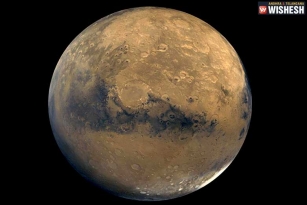
A new type of engine that harvests energy from carbon dioxide could power life on Mars, scientists say. Researchers propose a new kind of engine for producing energy based on the Leidenfrost effect, a phenomenon which happens, when a liquid comes into near contact with a surface much hotter than its boiling point. This effect is commonly seen in the way water appears to skitter across the surface of a hot pan, but it also applies to solid carbon dioxide, commonly known as dry ice. Blocks of dry ice are able to levitate above hot surfaces protected by a barrier of evaporated gas vapour. The research was pioneered at Northumbria University, Newcastle and Edinburgh University proposes using the vapour created by this effect to power an engine.
"Carbon dioxide plays a similar role on Mars as water does on Earth. It is a widely available resource which undergoes cyclic phase changes under the natural Martian temperature variations," said Dr Rodrigo Ledesma-Aguilar, one of the co-authors of the research. "Perhaps future power stations on Mars will exploit such a resource to harvest energy as dry-ice blocks evaporate, or to channel the chemical energy extracted from other carbon-based sources, such as methane gas.
"One thing is certain; our future on other planets depends on our ability to adapt our knowledge to the constraints imposed by strange worlds, and to devise creative ways to exploit natural resources that do not naturally occur here on Earth," Ledesma-Aguilar said. Dr Gary Wells, co-author of the paper, explained the unique properties of an engine based on Leidenfrost effect. "The working principle of a Leidenfrost-based engine is quite distinct from steam-based heat engines; the high-pressure vapour layer creates freely rotating rotors whose energy is converted into power without the need of a bearing, thus conferring the new engine with low-friction properties," Wells said. The study was published in the journal Nature Communications.
By Premji

























